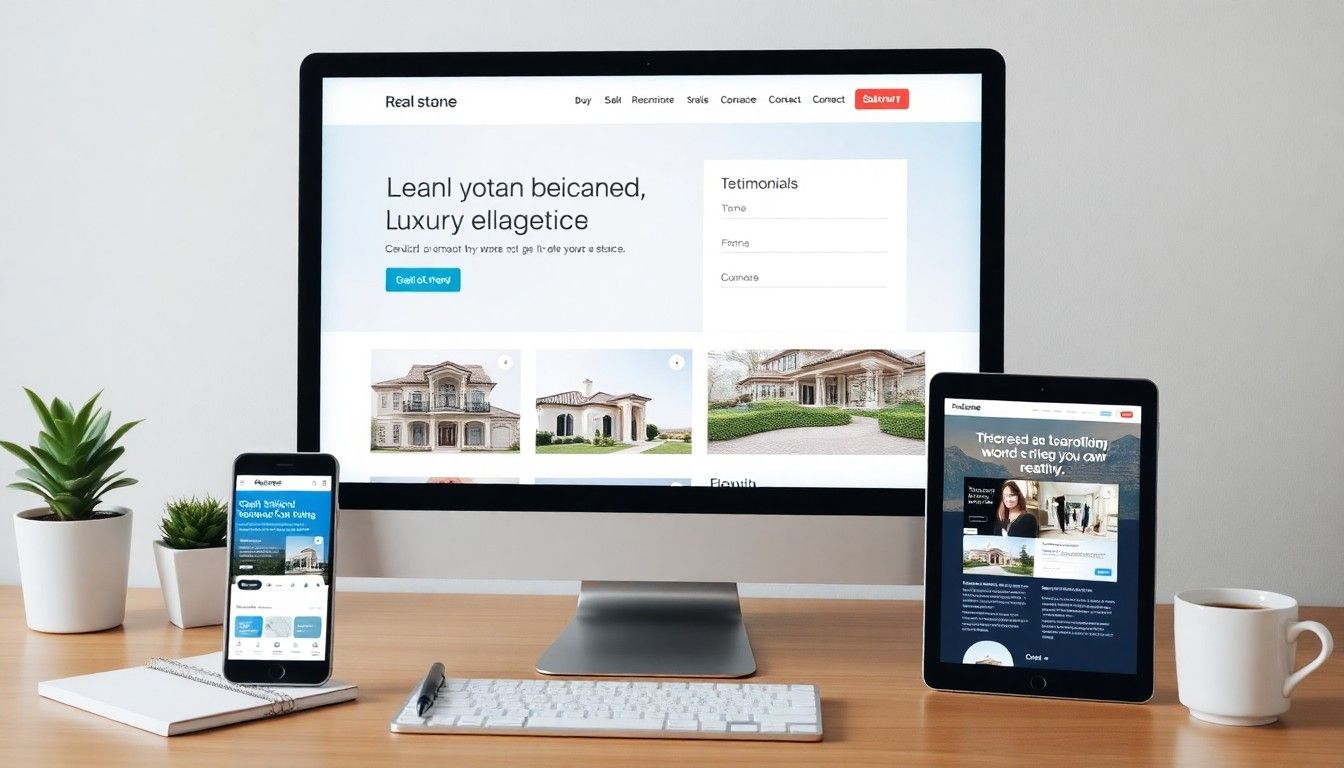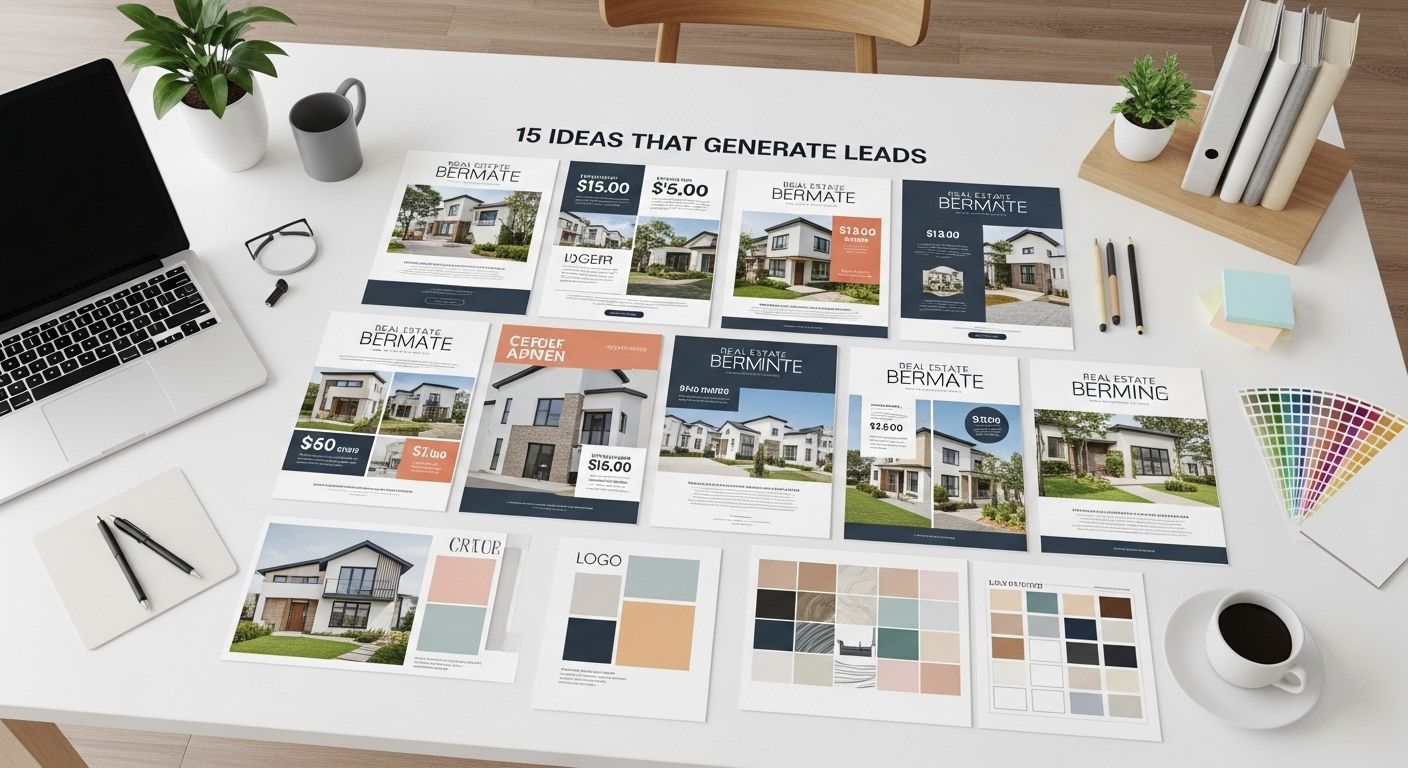12 Proven Marketing Strategies for Real Estate Developers: A Complete 2025 Playbook

Property developers who master digital strategies capture more leads and close deals faster than their competitors. Digital marketing trends show that 52% of buyers found their homes online (Source: Agent Advice).
Successful real estate marketing combines strategic planning, digital innovation, and measurable results.
This playbook presents 12 proven strategies that position property developers at the forefront of their market while maximizing ROI on marketing investments.
From high-converting websites to immersive 3D property tours, these strategies leverage cutting-edge technology to showcase developments effectively. Each approach adapts to various budget levels while delivering professional results that attract qualified buyers.
Whether launching a new development or enhancing existing marketing efforts, these strategies provide a framework for sustainable growth. The following sections detail implementation steps, technical requirements, and performance metrics for each strategy.
1. Strategic Foundation: Goals and Audience Analysis
Successful real estate marketing starts with precise goals and deep audience understanding. Property developers achieve higher conversion rates by aligning marketing efforts with specific objectives and buyer preferences. The real estate industry maintains a 4.7% average conversion rate (Source: Promodo).
Setting Clear Marketing Objectives
Define specific, measurable goals for your development projects. Track metrics like lead generation rates, website engagement, and conversion values. Establish timeframes for each marketing milestone to maintain momentum and measure progress.
Strategic marketing planning requires clear performance indicators. Focus on metrics that directly impact your bottom line: lead quality, cost per acquisition, and sales velocity.
Understanding Your Target Audience
Build detailed buyer personas based on demographic data and behavioral patterns. Analyze factors like income levels, lifestyle preferences, and property requirements. Track engagement metrics across different channels to refine your targeting approach.
Collect and analyze customer feedback systematically. Use surveys, website analytics, and sales team insights to understand buyer motivations. Apply these insights to create more targeted marketing messages and property presentations.
Data-Driven Decision Making
Lead Generation
- Key Metrics: Conversion Rate, Cost per Lead
- Measurement Frequency: Weekly
Brand Awareness
- Key Metrics: Website Traffic, Social Engagement
- Measurement Frequency: Monthly
Sales Performance
- Key Metrics: Sales Velocity, Deal Close Rate
- Measurement Frequency: Monthly
Monitor performance metrics consistently to optimize marketing strategies. Adjust campaigns based on real-time data and market responses. Focus resources on channels and messages that deliver the strongest results.
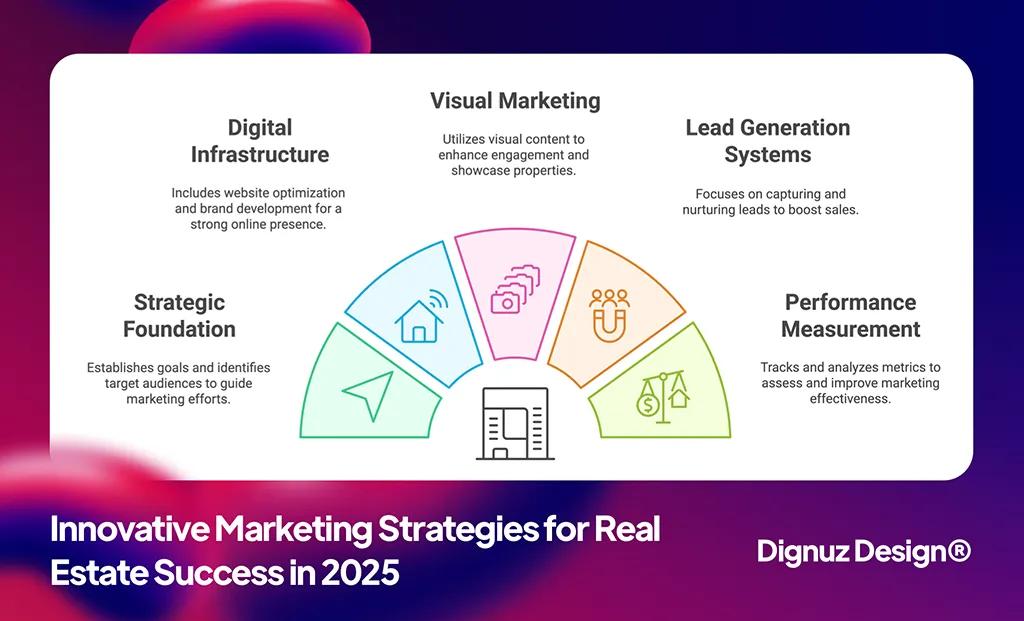
2. Digital Brand Development
Strong digital branding differentiates successful property developers in competitive markets. Major real estate platforms like Zillow attract 365.8 million monthly visitors (Source: Real Estate Agent PDX). Your brand must stand out across all digital touchpoints.
Creating a Memorable Brand Identity
Develop a distinctive visual identity that reflects your development projects' quality and value. Select colors, typography, and design elements that communicate professionalism and reliability. Maintain consistency across all marketing materials and digital platforms.
Luxury real estate marketing demands sophisticated brand presentation. Invest in professional design assets that elevate your development projects above competitors.
Digital Brand Guidelines
Establish clear guidelines for brand usage across digital channels. Document specific requirements for logo placement, color codes, and typography. Create templates for common marketing materials to ensure brand consistency.
Build a comprehensive brand style guide covering visual elements and messaging tone. Include examples of correct brand application across different marketing contexts. Share guidelines with all team members and marketing partners.
Brand Voice Development
Define a distinctive brand voice that resonates with your target audience. Balance professionalism with approachability in all communications. Create messaging frameworks that highlight your developments' unique value propositions.
Digital Presence Optimization
- Website branding alignment
- Social media profile optimization
- Email template standardization
- Marketing collateral consistency
Audit your digital presence regularly to maintain brand consistency. Review all customer touchpoints to ensure alignment with brand guidelines. Update digital assets promptly when brand elements evolve.
3. High-Converting Website Development
A high-performing website serves as your development projects' digital showcase. Top real estate websites achieve conversion rates exceeding 5% through optimized design and functionality (Source: Promodo). Strategic website development focuses on user experience and conversion optimization.
Mobile-First Design Implementation
Prioritize mobile responsiveness in your website architecture. Optimize loading speeds for all device types and screen sizes. Ensure seamless navigation and functionality across mobile platforms.
Custom website solutions deliver superior results compared to generic templates. Implement responsive design patterns that showcase property features effectively on any device.
Conversion Rate Optimization
Structure your website to guide visitors toward specific actions. Position call-to-action buttons strategically throughout the user journey. Create clear pathways to property information and contact forms.
Implement heat mapping and user tracking tools to analyze visitor behavior. Test different layouts and content arrangements to maximize engagement. Optimize form fields and submission processes for higher completion rates.
Technical Performance Optimization
Page Load Speed
- Target Value: Under 3 seconds
- Impact on Conversions: Direct correlation with bounce rate
Mobile Responsiveness
- Target Value: 100% compatibility
- Impact on Conversions: Affects user engagement
Core Web Vitals
- Target Value: All metrics in green
- Impact on Conversions: Influences search ranking
Content Organization
Structure property information logically and accessibly. Create intuitive navigation systems that highlight key development features. Implement search functionality that helps users find relevant properties quickly.
Optimize image galleries and virtual tours for seamless viewing. Balance visual impact with loading performance. Include detailed property specifications in scannable formats.
4. Visual Marketing Evolution
Visual content drives property marketing success in the digital age. Virtual tours prove particularly effective, with 8% of buyers purchasing properties based solely on virtual viewings (Source: Virtuance). Modern visual marketing combines multiple formats to create immersive property experiences.
3D Virtual Property Tours
3D property visualization transforms how buyers explore developments. Create detailed virtual tours that showcase spatial relationships and property features. Enable potential buyers to experience properties remotely with confidence.
Implement interactive elements within virtual tours to increase engagement. Add hotspots highlighting key features and specifications. Provide multiple viewing angles and daylight variations to create comprehensive property previews.
Professional Photography Standards
Professional property presentation requires exceptional photography. Capture images that emphasize space, light, and architectural details. Maintain consistent quality across all visual assets.
Develop photography guidelines for all property listings. Include specifications for lighting, composition, and post-processing. Create shot lists ensuring comprehensive coverage of each property's features.
Video Marketing Integration
Produce engaging video content that tells your development's story. Create property walkthrough videos highlighting unique features and amenities. Develop lifestyle content that showcases the surrounding community.
Visual Content Distribution Strategy
Virtual Tours
- Primary Platforms: Website, Property Portals
- Optimal Format: Interactive 3D
Photography
- Primary Platforms: All Platforms
- Optimal Format: High-resolution Images
Video Content
- Primary Platforms: Social Media, YouTube
- Optimal Format: Short-form and Full Tours
Coordinate visual content distribution across marketing channels. Optimize format and resolution for each platform's requirements. Track engagement metrics to refine visual content strategy.
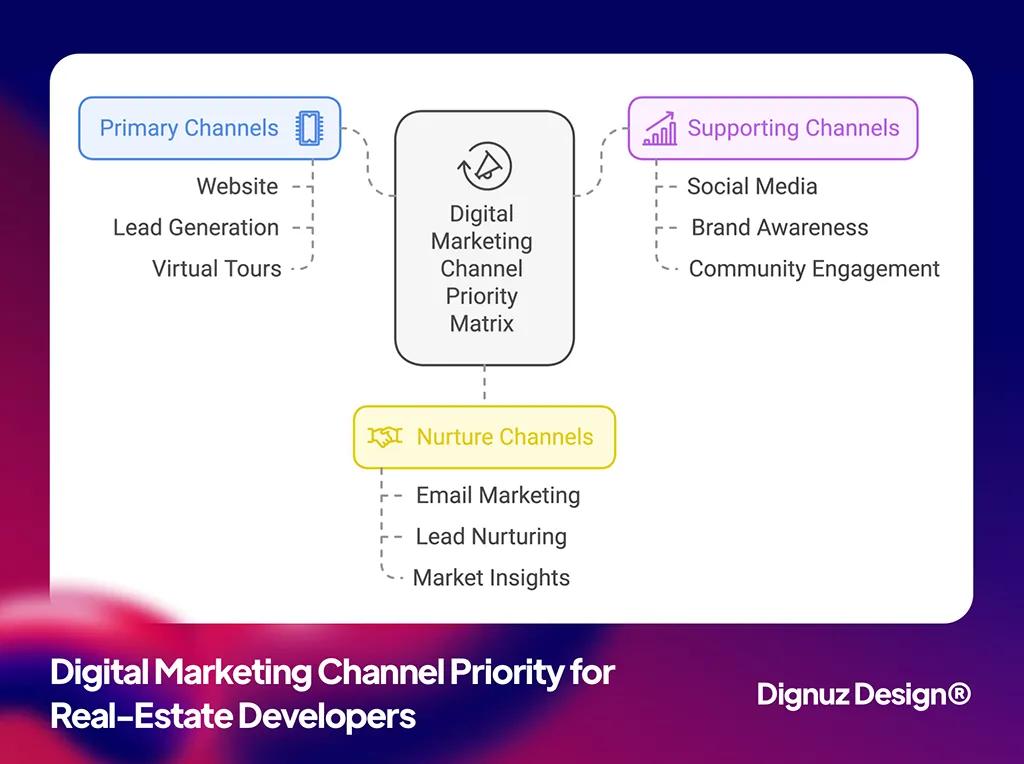
5. Data-Driven Decision Making
Strategic marketing decisions require comprehensive data analysis. Market dynamics shift rapidly, as evidenced by the 73% drop in new office completions (Source: JLL Global Real Estate Outlook). Data-driven strategies help developers adapt to changing market conditions.
Analytics Implementation
Install comprehensive tracking systems across digital platforms. Monitor user behavior, engagement patterns, and conversion paths. Implement advanced analytics tools to capture detailed performance metrics.
Marketing trend analysis requires robust data collection systems. Configure analytics to track specific goals and conversion events. Ensure proper integration across all marketing channels.
Key Performance Indicators
Website Performance
- Key Indicators: Page Views, Time on Site, Bounce Rate
- Analysis Frequency: Weekly
Lead Generation
- Key Indicators: Conversion Rate, Lead Quality Score
- Analysis Frequency: Daily
Marketing ROI
- Key Indicators: Cost per Lead, Customer Acquisition Cost
- Analysis Frequency: Monthly
Data Interpretation and Action
Transform raw data into actionable insights. Identify patterns in user behavior and campaign performance. Develop response strategies based on performance metrics.
Create automated reporting systems for key stakeholders. Present data visualizations that highlight important trends. Enable quick decision-making through real-time performance dashboards.
Performance Optimization Process
- Regular performance audits
- A/B testing of marketing elements
- Campaign optimization based on results
- ROI analysis and budget allocation
Implement continuous improvement cycles based on data insights. Adjust marketing strategies according to performance metrics. Focus resources on channels and tactics showing the strongest returns.
Predictive Analytics Integration
Use historical data to forecast market trends and buyer behavior. Develop predictive models for lead scoring and conversion probability. Apply insights to optimize marketing resource allocation.
6. Digital Channel Optimization
Effective real estate marketing requires strategic presence across multiple digital channels. Each platform serves distinct purposes in your marketing ecosystem. Optimize each channel while maintaining consistent brand messaging and user experience.
Platform Selection and Prioritization
Choose digital channels based on target audience behavior and preferences. Focus resources on platforms that deliver qualified leads and measurable results. Create channel-specific strategies that leverage each platform's unique features.
Social media marketing requires platform-specific approaches. Tailor content formats and messaging to each channel's audience expectations.
Channel Integration Strategy
Website
- Primary Purpose: Lead Generation
- Content Focus: Property Details, Virtual Tours
Social Media
- Primary Purpose: Brand Awareness
- Content Focus: Visual Content, Updates
Email Marketing
- Primary Purpose: Lead Nurturing
- Content Focus: Personalized Updates
Content Distribution Framework
Develop systematic content distribution processes across channels. Schedule content publication to maximize audience engagement. Monitor performance metrics to optimize posting schedules.
Create channel-specific content guidelines and templates. Maintain brand consistency while adapting to platform requirements. Implement quality control processes for all published content.
Cross-Channel Optimization
- Unified messaging strategy
- Consistent brand presentation
- Integrated lead tracking
- Cross-platform retargeting
Implement cross-channel tracking systems to measure campaign effectiveness. Monitor user journeys across different platforms. Optimize channel mix based on performance data.
Platform-Specific Enhancement
Optimize each channel's technical elements for maximum performance. Configure platform-specific features and tools effectively. Regular audit and update platform settings for optimal results.
Maintain platform-specific content calendars and guidelines. Adapt content formats for each channel's requirements. Test and refine posting strategies based on engagement metrics.
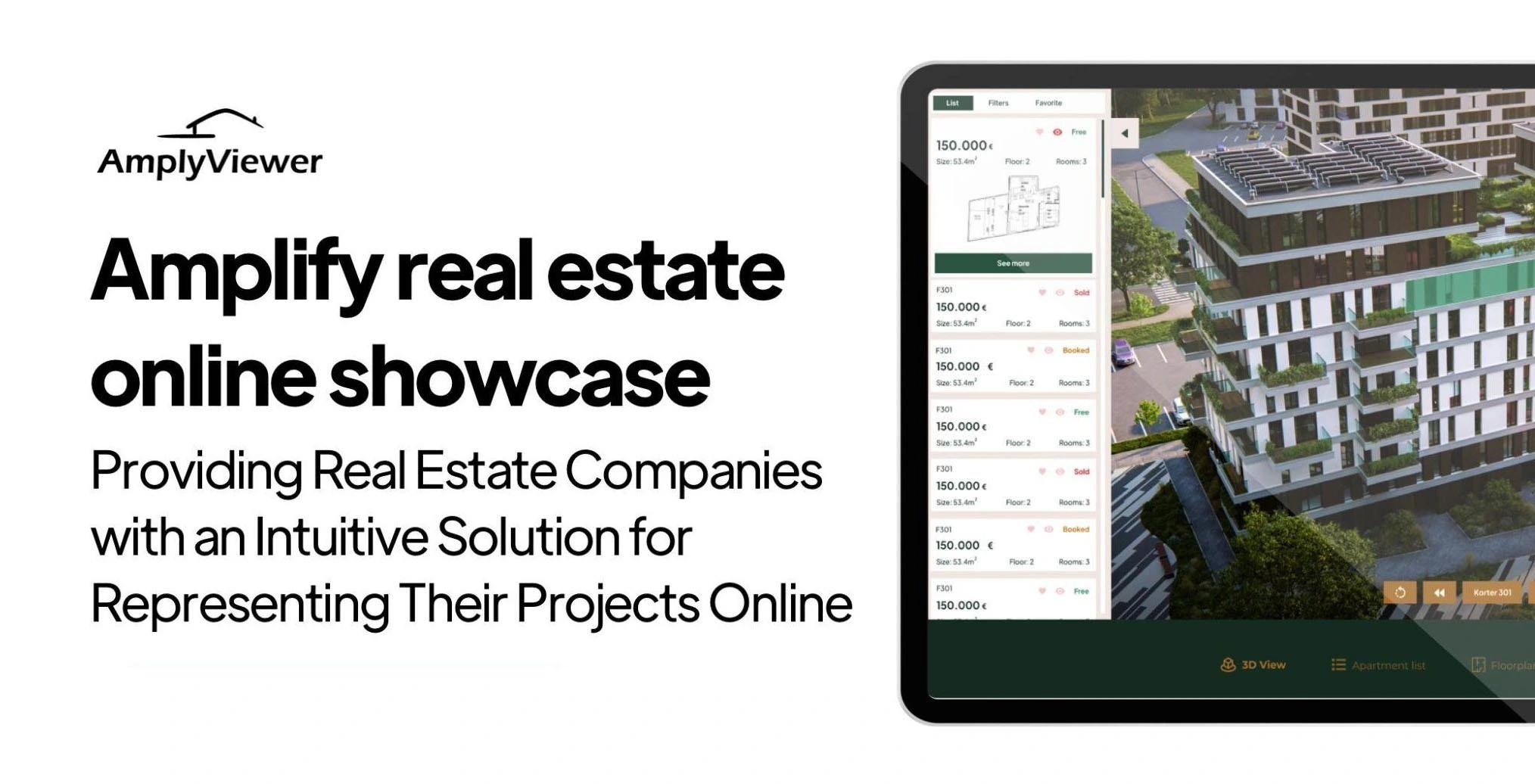
💻 Let us help you create a stunning online showcase for your projects that works seamlessly across all devices. Ready to amplify your real estate business? 👉 Explore AmplyViewer now
7. Lead Generation Systems
Systematic lead generation drives sustainable growth for property developers. Implement automated systems that capture, qualify, and nurture potential buyers. Create scalable processes that maintain personalized engagement while maximizing efficiency.
Lead Capture Optimization
Design strategic lead capture points throughout your digital presence. Create compelling lead magnets that offer genuine value to potential buyers. Optimize form fields and submission processes for higher completion rates.
Effective marketing messages convert visitors into qualified leads. Test different value propositions and calls-to-action to maximize conversion rates.
Email Marketing Automation
Welcome Series
- Purpose: Initial Engagement
- Timing: Immediate
Property Updates
- Purpose: Interest Nurturing
- Timing: Weekly
Market Insights
- Purpose: Authority Building
- Timing: Monthly
Lead Nurture Sequences
Develop targeted nurture campaigns for different buyer segments. Create content sequences that address specific buyer concerns and interests. Implement behavioral triggers for personalized follow-up communications.
Structure nurture sequences to guide prospects through the buying journey. Include educational content, property highlights, and market insights. Maintain engagement through valuable, relevant information.
Contact Management Systems
- Lead scoring implementation
- Automated segmentation
- Activity tracking
- Follow-up automation
Configure CRM systems to track lead interactions and preferences. Implement lead scoring to prioritize sales team efforts. Automate routine follow-up tasks while maintaining personal touch points.
Performance Monitoring
Track key metrics throughout the lead generation process. Monitor conversion rates at each stage of the funnel. Analyze engagement patterns to optimize nurture sequences.
Implement regular testing of lead generation elements. Refine messaging and offers based on performance data. Continuously optimize systems for improved results.
8. Search Marketing Strategies
Search marketing drives qualified traffic to property development websites. Combine organic SEO and paid search campaigns to maximize visibility. Create comprehensive strategies that capture buyers at different stages of their property search.
SEO Foundation Building
Optimize website structure and content for search engines. Focus on property-specific keywords and location-based terms. Implement technical SEO best practices across your digital presence.
Digital ad design complements organic search efforts. Create compelling visual assets that enhance click-through rates.
Keyword Strategy Development
Location-Based
- Purpose: Local Search Visibility
- Priority Level: High
Property Features
- Purpose: Specific Searches
- Priority Level: Medium
Development Name
- Purpose: Brand Searches
- Priority Level: High
Paid Search Campaign Structure
Design targeted PPC campaigns for different property types and locations. Structure ad groups around specific buyer intentions and property features. Implement precise audience targeting to maximize ad spend efficiency.
Create compelling ad copy that highlights unique selling propositions. Test different messaging approaches and calls-to-action. Monitor and optimize campaign performance continuously.
Local Search Optimization
- Google Business Profile optimization
- Local keyword targeting
- Location-specific landing pages
- Local citation building
Optimize your presence for location-based searches. Create detailed property location pages with relevant information. Build local citations to strengthen geographic relevance.
Content Strategy Integration
Develop content that answers common property buyer queries. Create informative articles about your developments and local areas. Maintain regular content updates to support search visibility.
Implement structured data markup for property listings. Optimize images and media files with relevant metadata. Create content clusters around main property themes.
Performance Tracking
Monitor search ranking positions for target keywords. Track organic and paid search traffic separately. Analyze conversion rates from different search channels.
Adjust strategies based on search performance data. Refine keyword targeting and ad campaigns regularly. Focus resources on highest-performing search channels.
9. Community Engagement
Community engagement builds trust and establishes local market authority. Create meaningful connections within your development's neighborhood. Generate authentic advocacy through active community participation.
Local Market Positioning
Position your development as an integral part of the community fabric. Highlight local amenities, lifestyle benefits, and neighborhood features. Create content that showcases community integration.
Stand out in your market through authentic community involvement. Build relationships with local businesses and community leaders.
Event Marketing Strategy
Open Houses
- Purpose: Direct Property Showcase
- Target Audience: Potential Buyers
Community Events
- Purpose: Brand Awareness
- Target Audience: Local Residents
Educational Seminars
- Purpose: Authority Building
- Target Audience: First-time Buyers
Partnership Development
Create strategic partnerships with local businesses and organizations. Develop co-marketing initiatives that benefit all parties. Build a network of community advocates for your developments.
Collaborate with local influencers and community leaders. Support community initiatives and charitable causes. Generate positive local media coverage through meaningful partnerships.
Digital Community Building
- Social media community management
- Online neighborhood guides
- Local content creation
- Community feedback channels
Maintain active engagement across digital community platforms. Create valuable content that serves local audience interests. Foster online discussions about community development.
Reputation Management
Monitor and manage online reviews and feedback. Respond promptly to community concerns and questions. Maintain transparent communication about development impacts.
Build positive relationships with local media outlets. Share development news and updates proactively. Address potential concerns before they escalate.
Community Impact Measurement
Track community engagement metrics and sentiment. Measure the impact of community initiatives on sales. Analyze feedback to improve community relations strategies.
Document community contributions and involvement. Share success stories and positive outcomes. Demonstrate long-term commitment to community development.
10. Customer Experience Integration
Superior customer experience differentiates successful property developments. Create seamless interactions across all touchpoints. Transform interested prospects into confident buyers through exceptional service delivery.
Digital Experience Design
Craft intuitive digital journeys that guide prospects through your developments. Create personalized experiences based on user preferences and behavior. Implement smooth transitions between digital and physical interactions.
Luxury digital experiences require meticulous attention to detail. Design interfaces that reflect your development's premium quality.
Touchpoint Optimization
Website
- Experience Goal: Information Access
- Optimization Focus: Navigation Flow
Virtual Tours
- Experience Goal: Property Visualization
- Optimization Focus: Interactive Features
Contact Forms
- Experience Goal: Easy Engagement
- Optimization Focus: Form Simplification
Personalization Strategy
Implement dynamic content personalization across digital platforms. Tailor property recommendations based on user preferences. Create customized communication flows for different buyer segments.
Develop personalized follow-up sequences for inquiries. Customize virtual tours based on specific interests. Provide relevant content based on browsing history.
Service Automation
- Automated appointment scheduling
- Instant property information delivery
- Automated follow-up systems
- Smart notification systems
Balance automation with personal touch points. Implement chatbots for immediate response to basic queries. Maintain human interaction for complex discussions.
Feedback Integration
Create systematic feedback collection processes. Implement multiple channels for customer input. Use feedback data to enhance service delivery continuously.
Monitor customer satisfaction metrics regularly. Address concerns promptly and transparently. Share positive feedback and testimonials across marketing channels.
Experience Measurement
Track customer experience metrics across all touchpoints. Analyze user behavior patterns and preferences. Identify opportunities for experience enhancement.
Implement regular experience audits and updates. Test new features and improvements systematically. Maintain consistent quality across all interaction points.
11. Implementation Timeline
Strategic implementation ensures successful marketing strategy deployment. Create realistic timelines that account for resource availability. Prioritize initiatives based on impact and complexity.
Strategic Phasing
Break implementation into manageable phases. Align marketing activities with development milestones. Create clear dependencies between different marketing initiatives.
Strategic marketing implementation requires careful planning and coordination. Establish realistic timeframes for each phase.
Implementation Schedule
Foundation
- Key Activities: Website Development, Brand Setup
- Duration: 2-3 Months
Launch
- Key Activities: Content Creation, Channel Setup
- Duration: 1-2 Months
Optimization
- Key Activities: Performance Analysis, Refinement
- Duration: Ongoing
Resource Allocation
Distribute resources effectively across marketing initiatives. Align team capabilities with project requirements. Identify and address resource gaps proactively.
Balance internal capabilities with external expertise needs. Create clear roles and responsibilities. Establish accountability for key deliverables.
Milestone Planning
- Digital infrastructure setup
- Content development completion
- Channel launch sequence
- Performance benchmark establishment
Set clear success criteria for each milestone. Create measurable objectives for implementation phases. Track progress against established benchmarks.
Progress Monitoring
Implement regular progress review meetings. Track completion of key deliverables and milestones. Address implementation challenges promptly.
Document lessons learned throughout implementation. Adjust timelines based on actual progress. Maintain flexibility while ensuring steady advancement.
Quality Assurance
Establish quality checkpoints throughout implementation. Review deliverables against quality standards. Ensure consistency across all marketing elements.
Create testing protocols for digital assets. Verify functionality across all platforms. Maintain brand standards throughout implementation.
12. Performance Measurement
Comprehensive performance measurement ensures marketing effectiveness. Track key metrics across all marketing initiatives. Create data-driven optimization cycles for continuous improvement.
Success Metrics Framework
Establish clear performance indicators for each marketing channel. Monitor both leading and lagging indicators. Create benchmarks for success measurement.
Marketing trend analysis informs performance expectations. Adjust metrics based on market conditions and industry standards.
Key Performance Indicators
Digital Engagement
- Metrics: Website Traffic, Time on Site
- Review Frequency: Weekly
Lead Generation
- Metrics: Conversion Rate, Lead Quality
- Review Frequency: Daily
Sales Performance
- Metrics: Sales Velocity, Close Rate
- Review Frequency: Monthly
Reporting Systems
Implement automated reporting dashboards for real-time monitoring. Create customized reports for different stakeholder groups. Ensure data accessibility and clarity.
Develop systematic reporting schedules and formats. Include trend analysis and performance insights. Highlight actionable recommendations in reports.
Optimization Protocols
- Regular performance reviews
- A/B testing programs
- Content effectiveness analysis
- Channel performance optimization
Establish systematic optimization processes. Test and refine marketing elements continuously. Implement improvements based on performance data.
ROI Analysis
Calculate return on investment for each marketing initiative. Track cost per acquisition across channels. Measure lifetime value of converted leads.
Analyze marketing spend effectiveness regularly. Adjust budget allocations based on performance. Focus resources on highest-performing channels.
Continuous Improvement
Create feedback loops for ongoing optimization. Document successful strategies and lessons learned. Build on proven approaches while testing new opportunities.
Maintain flexibility in performance measurement. Adapt metrics to changing market conditions. Focus on long-term success indicators.
Frequently Asked Questions
What is the typical timeline for implementing these marketing strategies?
Implementation typically spans 3-6 months for initial setup. Core digital infrastructure requires 2-3 months to establish. Ongoing optimization continues throughout your marketing program.
How should marketing budgets be allocated across these strategies?
Allocate 40-50% to digital infrastructure and content creation initially. Reserve 30-40% for ongoing campaign management. Maintain 10-20% for testing and optimization activities.
Which strategies should be prioritized for immediate implementation?
Start with website development and brand identity establishment. Follow with lead generation systems and visual content creation. Add advanced strategies as core elements stabilize.
How can smaller development firms compete with limited budgets?
Focus on high-impact, cost-effective strategies initially. Prioritize website optimization and local SEO. Scale paid advertising gradually based on performance data.
What internal resources are needed for successful implementation?
Assign dedicated marketing coordination responsibilities. Partner with specialized service providers for technical needs. Maintain consistent internal communication channels.
Conclusion
Successful real estate marketing combines strategic planning with effective implementation. Focus on building strong digital foundations while maintaining flexibility for market changes. Create systematic approaches to measurement and optimization.
Marketing education supports ongoing strategy refinement. Stay informed about industry trends and emerging opportunities.
Next Steps
- Assess current marketing capabilities
- Identify priority implementation areas
- Create detailed action plans
- Establish measurement systems
Begin with a thorough audit of your current marketing efforts. Identify gaps and opportunities in your existing strategy. Create detailed implementation plans for priority initiatives.
Take Action Today
Transform your property development marketing with strategic digital solutions. Contact our team to discuss your specific marketing needs and objectives. Schedule a consultation to begin your marketing optimization journey.


